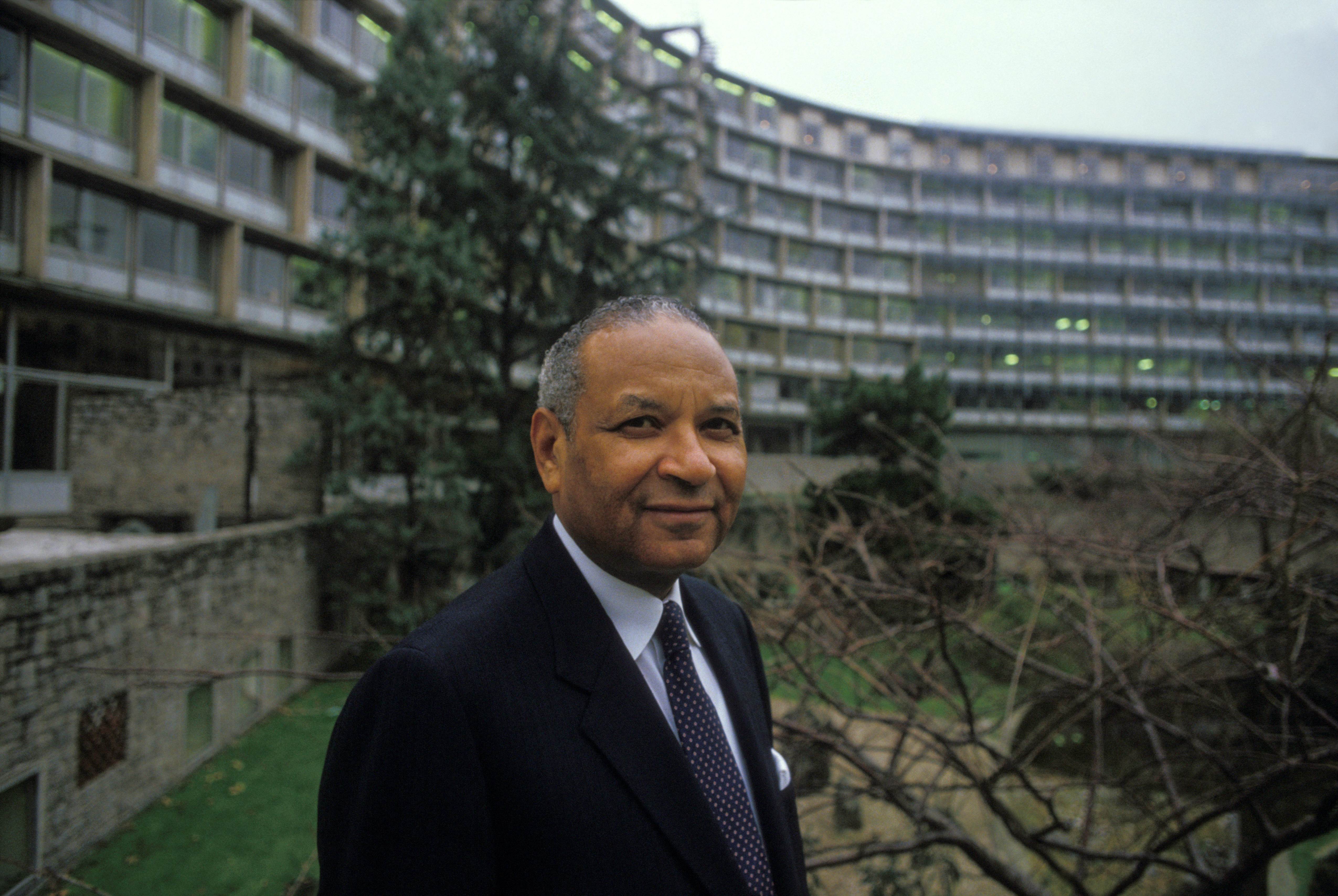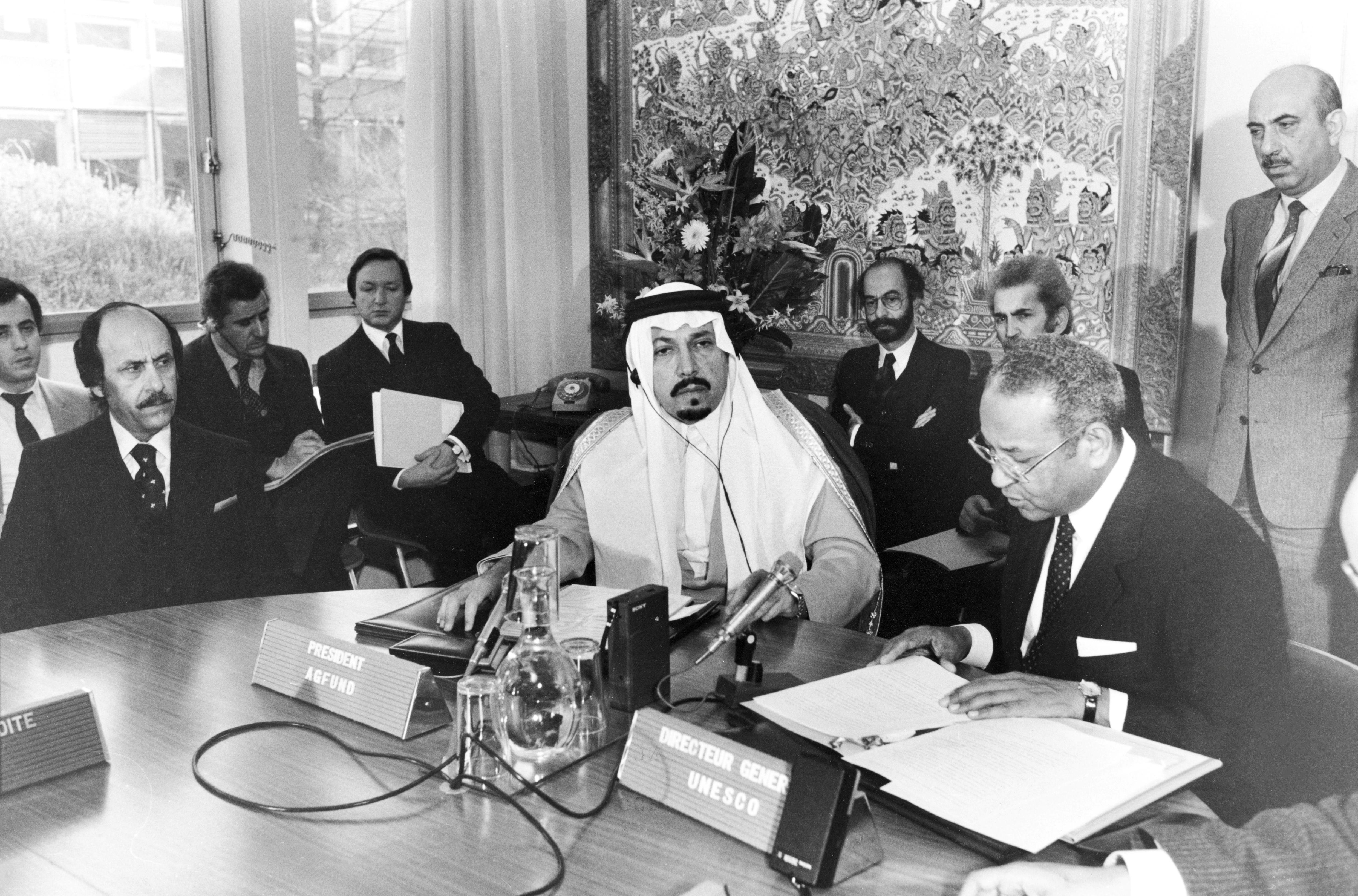قبل أسابيع، توفي في العاصمة السنغالية داكار أحمد مختار امبو، الذي كان أول أفريقي أسود يتولى رئاسة منظمة دولية كبرى عندما انتخب مديرا عاما لمنظمة اليونسكو في منتصف السبعينيات، عن عمر ناهز 103 أعوام. شكل امبو أحد الأباء المؤسسين لما صار يعرف اليوم بالجنوب العالمي، وكانت فترة إدارته لليونسكو حافلةً بالسجال والجدل مع الغرب، وفي عهده انسحبت كل من بريطانيا والولايات المتحدة من المنظمة؛ فقد طرح الرجل باكرا نقدا جذريا لحالة احتكار الغرب للمعلومات والأخبار، وصياغة معايير الصحافة وتداول المعلومات دوليا، ولا سيما من خلال الترويج لـ"النظام العالمي الجديد للمعلومات" (1) وهو ما عدّته الحكومات الغربية خطوة لكسر هيمنتها على المعلومات بذريعة "تهديد حرية الصحافة". في مؤتمر اليونسكو عام 1982، رد امبو على الحملة الغربية قائلاً أمام الجمهور: "إذا كانت وسائل الإعلام الغربية تتمتع بالحرية في قول ما يحلو لها، فإن الآخرين يتمتعون بالحق في الحكم على ما تقوله"، فجاء الردّ "تصفيقا مدويا". كان الجنوب العالمي متعطشا لكسر تلك الهيمنة المديدة، التي مثلتها أربع وكالات أنباء غربية. وبعد عقود من تلك المحاولة، التي فشلت، قال امبو في مقابلة (2) مطولة نُشرت في كتاب عام 2021: "إذا ذهبت إلى أي دولة أفريقية، فستحصل على أخبار تنتجها دول الشمال، بما في ذلك الأخبار التي تهمنا، والتي يوزعها الشمال وفقًا لمصالحه الخاصة".
شكل محمد مختار امبو أحد الأباء المؤسسين لما صار يعرف اليوم بالجنوب العالمي، وكانت فترة إدارته لليونسكو حافلة بالسجال والجدل مع الغرب، وفي عهده انسحبت كل من بريطانيا والولايات المتحدة من المنظمة؛ فقد طرح الرجل باكرا نقدا جذريا لحالة احتكار الغرب للمعلومات والأخبار.
في سياق محاولته، كلف امبو شون ماكبرايد، الحائز على جائزة نوبل للسلام، برئاسة لجنة هدفها وضع مجموعة من التوصيات لجعل تمثيل وسائل الإعلام العالمية أكثر إنصافا. وقد أصدرت لجنة ماكبرايد تقريرا بعنوان "أصوات متعددة، عالم واحد"، الذي حدد الفلسفة الرئيسية لنظام الاتصالات المعلوماتية العالمي الجديد في تقليل الاختلالات في بنية إنتاج الأخبار وتوزيعها، وتعزيز إستراتيجية عالمية للتواصل مع احترام الهويات الثقافية وحقوق الأفراد، وكذلك تعزيز إنشاء سياسات اتصال وطنية لتكون متماسكة ومدمجة في عمليات التنمية، ولكن تلك المحاولة جاءت في سياق دولي كان يتجه نحو عصر هيمنة الإمبراطورية الأمريكية الأحادية، التي تكرست بعد نهاية الحرب الباردة وسيادة اقتصاد السوق في طوره النيوليبرالي؛ إذ صارت الاحتكارات الغربية في كل القطاعات -وليس فقط في الإعلام والصحافة- هي المحرك الأساسي لكل النشاط البشري. وبدا واضحا أن امبو قد وصل متأخرا، ولكنه مع ذلك لمس جرحا عميقا في علاقات التطور اللامتكافئ بين شمال العالم وجنوبه، التي يفسرها سمير أمين بأنها قائمة على خمسة ضوابط هي: التمويل، والموارد الطبيعية، والعلوم والتكنولوجيا، وأسلحة الدمار الشامل، والمعلومات.
ولكن التحولات التي شهدها الشمال نفسه، من تدهور مديد من منظومة الهيمنة الفكرية والتحلل الأيديولوجي لليبرالية، وتحولها إلى نزعات شعبوية متطرفة في ساحات كثيرة، فضلا عن ظهور قوى اقتصادية وجيوسياسية منافسة خارج المعسكر الغربي، كل ذلك أعاد الأسئلة التي طرحها داكار أحمد مختار امبو إلى الواجهة مرة أخرى.
في مؤتمر اليونسكو عام 1982، رد امبو على الحملة الغربية قائلاً أمام الجمهور: "إذا كانت وسائل الإعلام الغربية تتمتع بالحرية في قول ما يحلو لها، فإن الآخرين يتمتعون بالحق في الحكم على ما تقوله"، فجاء الردّ "تصفيقا مدويا".

منذ الغزو الروسي لأوكرانيا، ثم هجوم السابع من أكتوبر وما أعقبه من حرب إبادة إسرائيلية مستمرة بحق الشعب الفلسطيني، صارت تلك الأسئلة أكثر إلحاحا، ليس فقط في مجالات نخبوية ومهنية ضيقة أصابها الإحباط بسبب الغياب شبه الكامل لآرائها في المناقشات الدولية وبسبب فرض نظرة عالمية ضيقة وغربية على بلدانها بشأن المعضلات التي تواجهها، بل يطرحها الجمهور الواسع؛ بشأن التحيزات العنصرية وغير المهنية لوسائل الإعلام الغربية تجاه كل ما يحدث في بقية العالم. خلق ذلك شكلا من أشكال التضامن اللاإرادي وغير المخطط له أحيانا بين أشتات الجنوب العالمي المنفصلة قوميا ودينيا وثقافيا، ولكنها متصلة بروابط المظلومية وقوة الضحية.
ليس سهلا القبض على تعريف نهائي للجنوب العالمي. ينطوي هذا المصطلح على تعقيد مثير للجدل في كثير من الأحيان بسبب الأبعاد التاريخية والسياسية والاجتماعية والاقتصادية له، وتعود الصياغة الأصلية إلى الحرب الباردة كوسيلة لوصف المناطق في أمريكا اللاتينية وأفريقيا وآسيا وأوقيانوسيا، التي عانت من التخلف التنموي، نتيجةً للاستعمار الغربي. ومع ذلك، تطور هذا المصطلح وأصبح موضع نقاش واسع النطاق، ويرجع ذلك إلى حد كبير إلى محاولته تجميع الدول شديدة التنوع تحت مظلة واحدة، ولكن من الصعب أن نلخص هذه البعد التاريخي بمصطلح واحد؛ ذلك أن الدول الواقعة في الجنوب العالمي لديها تجارب استعمارية مختلفة للغاية، ومستويات تصنيع مختلفة، وأنظمة سياسية مختلفة، الأمر الذي يجعل من الصعب بناء تعريف متماسك على أساس المعايير التاريخية أو السياسية وحدها. يشمل هذا الجنوب العالمي طيفا اقتصاديا واسع النطاق، من البلدان ذات الدخل المنخفض إلى الاقتصادات الناشئة، التي صارت تتمتع بنفوذ جيوسياسي كبير وقوة اقتصادية. ومن الناحية الجغرافية، فإن هذا المصطلح مضلل لأنه لا ينطبق بشكل صارم على البلدان الواقعة في نصف الكرة الجنوبي، فضلاً عن أنه يشمل مجتمعات ذات ثقافات ولغات وأديان وبنى اجتماعية مختلفة إلى حد كبير. لكن هذه التناقضات التاريخية والثقافية والجغرافية لا تنفي وجود هذا الجنوب، بوصفه مساحة مفاهيمية تتميز بتاريخ مشترك من المقاومة للقمع الاستعماري، وأيضاً ديناميكية قوة مضادة؛ إذ يوضع الجنوب العالمي مقابلًا موضوعيًّا للشمال العالمي، فالجنوب العالمي يستمد تعريفه ودوره وهويته من كونه المضاد للهمينة الغربية؛ لذلك يسمى أحيانا على نحو أكثر شمولاً بـ"بقية العالم".
في سياق تضادٍّ بين الجنوب العالمي والغرب، يمكن طرح مسألة الصحافة أو الإعلام بوصفها جزءا من هذا التضاد. بالإشارة السابقة إلى مقومات الهيمنة الغربية في عصر ما بعد الحرب الباردة، وضع سمير أمين السيطرة على الأخبار والمعلومات إلى جانب السيطرة على الموارد الطبيعية؛ ذلك أنها تؤمن الهيمنة الثقافية والنفسية، التي هي أكثر حصانة وتأثيرا من السيطرة بالسلاح والقوة؛ فقد أدى فرض معايير الصحافة الغربية على مدى عقود إلى تعزيز التحيزات عن غير قصد، من خلال وضع الجنوب العالمي في إطار عدسة غربية. وكثيرا ما تسلط الأخبار الغربية الضوء على الفقر أو عدم الاستقرار السياسي أو الفساد في الجنوب، وهو ما قد شكل تصورات دولية سلبية وغذى طويلا الصور النمطية عن الجنوب وعن مجتمعاته وثقافاته، فهذا النهج يميل إلى إعطاء الأولوية للروايات المثيرة أو التي تحركها الصراعات، مما قد يطغى على قصص الإبداع أو التقدم الاجتماعي. وعندما يتبنى الصحفيون المحليون المعايير الغربية لجذب الجمهور الدولي، فإن تغطيتهم قد تخاطر بتكرار هذه التحيزات، وهو ما يقلل من شأن المجتمعات المتنوعة والمعقدة إلى مجرد مجازات تبسيطية وسلبية واستشراقية في كثير من الأحيان. ورغم وجود محاولات صحفية غربية مستقلة للقَطْع مع هذا النهج، فإن سيطرة وكالات الأنباء العالمية، التي تنتمي فكريا وماديا للغرب، ذات دور مهم في تغطية أخبار الجنوب العالمي، وتقتصر في كثير من الأحيان على التفسيرات الغربية أو الصراعات البارزة، ما يؤدي إلى إهمال القضايا اليومية التي تهم السكان المحليين. يخلق هذا الاعتماد مرشحا غربيا للأخبار، حيث تملي هذه الوكالات القصص التي تُعدّ جديرة بالنشر وكيفية صياغتها، وقد يواجه الصحفيون المحليون الذين يلتزمون بهذه المعايير الغربية صعوبة في تغطية القصص التي تلقى صدى عميقا في مجتمعاتهم، نظرا للتوقعات الدولية لأنواع معينة من الروايات.
علاوة على ذلك، فإن هذا المعايير –الجيدة والمتوازنة من حيث المبدأ– تتحول أحيانا إلى سلاح للتغطيات المتحيزة ضد قضايا الجنوب العالمي؛ فغالبا ما تؤكد الصحافة الغربية على الموضوعية، ولكن في المناطق التي يكون فيها للصحافة دور مباشر في العدالة الاجتماعية أو النضال السياسي والوطني، قد تبدو الموضوعية الصارمة غير مناسبة، كما هو الشأن في البلدان التي تتعامل مع الظلم المستمر بعد الاستعمار أو عدم المساواة الاقتصادية، وقد يرى الصحفيون أنفسهم مدافعين عن الفئات المهمشة أو غير الممثلة، فيتخذون موقفا بدلا من البقاء محايدين. ولعل النموذج الفلسطيني اليوم أفضل مثال على ذلك؛ فوسائل الإعلام الغربي، تساوي باسم الموضوعية القاتلَ بالضحية، عبر إنتاج صحافة "لوم الضحايا" على نطاق واسع، ويبدو فرض موقف محايد تجاهلا للواقع الاجتماعي المعقد الذي يواجهه الصحفيون وتجاهلا لإمكانات الصحافة بوصفها أداة للتغيير الاجتماعي في هذه المناطق.
في المناطق التي يكون فيها للصحافة دور مباشر في العدالة الاجتماعية أو النضال السياسي والوطني، قد تبدو الموضوعية الصارمة غير مناسبة، كما هو الشأن في البلدان التي تتعامل مع الظلم المستمر بعد الاستعمار أو عدم المساواة الاقتصادية، وقد يرى الصحفيون أنفسهم مدافعين عن الفئات المهمشة أو غير الممثلة، فيتخذون موقفا بدلا من البقاء محايدين.
يُضاف إلى ذلك دور المعسكر الغربي في إعادة تشكيل الصحافة في الجنوب العالمي من خلال سياسات التمويل والمساعدات الخارجية، بوصفها جزءا من الجهود المنهجية والمنظمة منذ بداية القرن العشرين لتشكيل الصحافة بوصفها مؤسسة سياسية للجنوب العالمي تسهم في تأبيد الهيمنة الثقافية الغربية. وقد درس جايرو لوغو أوكاندو، في كتابه "المساعدات الخارجية والصحافة في الجنوب العالمي: لسان حال الحقيقة" (3) على نحو معمق هذه السياسات، والطريقة التي شُكِّلت بها الأيديولوجيات المهنية للصحافة في الجنوب العالمي؛ إذ دفعت المساعدات الخارجية نحو التقارب الثقافي بشأن أفكار النيوليبرالية وتوسيع الأسواق وأفضلية النموذج الأمريكي الأخلاقية، ما يعكس مجتمع السوق جنبًا إلى جنب مع توسع قوة الولايات المتحدة وثقافتها في جميع أنحاء العالم. ويرى لوغو أوكاندو أن هذه السياسات لم تقتصر على الحرب الباردة ولم تكن ظاهرة حديثة بحتة، بل كانت بدلا من ذلك تمرينا قسريا لبناء الأمة الاستعمارية وما بعد الاستعمارية . ونتيجة لذلك، يرى أن قواعد الصحافة تختلف بين المجتمعات في الجنوب العالمي، بغض النظر عن ادعاءات العالمية.
في المقابل، تحتاج إعادة تشكيل الصحافة في الجنوب العالمي نهجا يحترم الثقافات المحلية، ويشجع الاستقلال، ويعزز الابتكار. ويتطلب ذلك الابتعاد عن معايير الصحافة الغربية الصارمة لإنشاء أطر قابلة للتكيف تمكن الصحفيين من خدمة مجتمعاتهم بفاعلية، من دون الوقوع في براثن الدعاية؛ ذلك أن طيفا واسعا من أنظمة الجنوب العالمي يرفع اليوم شعارات التضاد مع الغرب، ليس على قاعدة التحرر بل على قاعدة وراثة الهيمنة الغربية على نحو آخر؛ فتطوير قواعد أخلاقيات الصحافة التي تأخذ في الحسبان السياقات السياسية والثقافية والاجتماعية المحلية، من شأنه أن يضمن أن تجد الممارسات الصحفية صدى لدى الجماهير المحلية. ويؤدي تحقيق التوازن بين الموضوعية والمناصرة في المناطق التي تواجه الظلم الاجتماعي إلى وضع معايير أخلاقية تدعم العدالة، مع التعامل مع قضايا المجتمع الحقيقية.
إن طيفا واسعا من أنظمة الجنوب العالمي يرفع اليوم شعارات التضاد مع الغرب، ليس على قاعدة التحرر بل على قاعدة وراثة الهيمنة الغربية على نحو آخر؛ فتطوير قواعد أخلاقيات الصحافة التي تأخذ في الحسبان السياقات السياسية والثقافية والاجتماعية المحلية، من شأنه أن يضمن أن تجد الممارسات الصحفية صدى لدى الجماهير المحلية.
كذلك يمكن للصحافة الموجهة نحو الحلول، التي تسلط الضوء على الاستجابات للمشكلات الاجتماعية، أن تحوّل السرد من السرد الموجه نحو الأزمات إلى السرد البنّاء؛ إذ تُظهر كيف تعالج المجتمعات قضايا مثل الفقر، والوصول إلى الرعاية الصحية، والتعليم، فهذا النهج لا يعمل على إعلام الجمهور فحسب، بل ويمكّنهم من تصور إمكانات التغيير الإيجابي، إضافة إلى ضرورة البحث عن نماذج مستدامة ماليا ومستقلة تحريرية. ومن أجل تقليل الاعتماد على التمويل الحكومي أو الأجنبي، يمكن لمنظمات الإعلام المحلية تجربة نماذج إيرادات متنوعة مثل العضوية المجتمعية، والتمويل الجماعي، والشراكات مع الشركات المحلية، وهو ما يسمح للصحفيين بالحفاظ على السيطرة التحريرية واستكشاف القصص المبتكرة، إلى جانب العمل على إنشاء شبكات صحفية إقليمية من خلال تطوير التحالفات داخل الجنوب العالمي لدعم تبادل المعرفة، وتجميع الموارد، وجهود المناصرة المصممة وفقا للظروف المحلية.








































